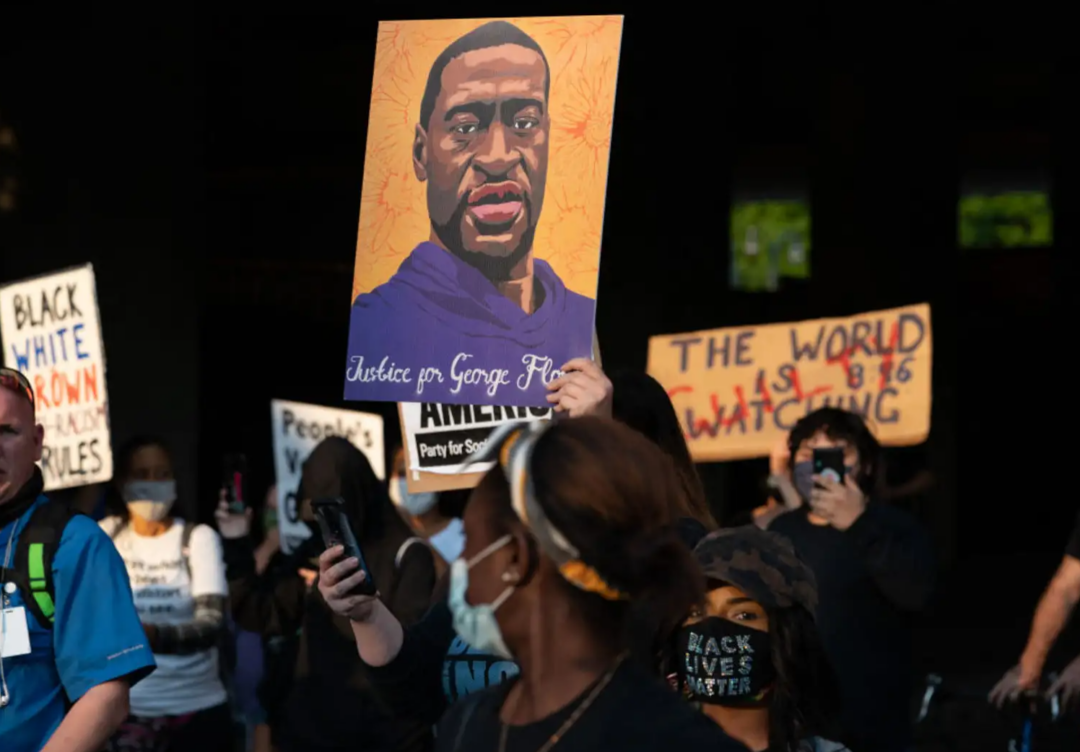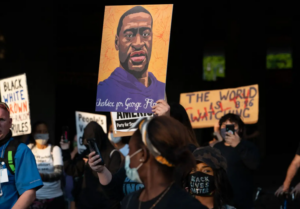
Until Justice Is Real: What’s Next After Chauvin Was Found Guilty of Murdering George Floyd
ByRashad Robinson
4/30/21 3:30PM
People march following the guilty verdict in the trial of Derek Chauvin on April 20, 2021, in Atlanta, Georgia.Photo: Elijah Nouvelage/AFP (Getty Images)
Hearing the guilty verdict handed down to Derek Chauvin last week brought up a lot of emotions for all of us. One of those emotions was relief—and nothing showed that relief more than the faces of the Floyd family. Despite the facts and video capturing all 9 minutes and 29 seconds of the murder of George Floyd, it was normal for us all to feel wary about the outcome. We’ll feel that anxiety again when Chauvin’s sentence is handed down; although we at least know he will be held accountable.
Now our collective challenge is to turn widespread relief into widespread resolve. We must ask ourselves: If this verdict is about accountability, then what is actual justice? How do we achieve it? There are three important tests that tell us if we’re truly on the path to making justice and accountability the norm, and we haven’t hit any of them yet.
1. Embrace the difference between self-expression and strategic action.
We need both self-expression and strategic action, but we will not achieve justice unless we escalate the latter. Last year, a movement rose up to make ignoring the murder of George Floyd impossible.
Justice is thousands of decisions made by millions of people to ensure the freedom and safety for Black people and all people—to change the rules that say the justice system isn’t doing its job if it’s not controlling Black people by sending us to prison, handing out exploitative fines, taking away our children, and harassing us as we go about our lives. Justice is about ending the war on Black people. Justice is no longer allowing politicians to target Black people for political gain or allowing Hollywood to perpetuate stereotypes for profit. Justice is not allowing there to be different sets of standards and systems for Black people than for anyone else. Ultimately, justice isn’t one decision made by 12 jurors. Creating real justice means taking careful action together.
That also means taking on the rules—both in policy and culture. We must keep up pressure on the myth-makers, the PR machine for police violence: from police unions to local news to Hollywood and politicians. A jury in Minneapolis didn’t fall for all the lies, but mayors, governors, prosecutors, and legislators still do. We will not see accountability for police without delivering accountability for politicians who still act as if the police are always right and Black people are always wrong (unless a video and a dozen witnesses are present otherwise).
One police officer was held accountable for his actions—the second in Minnesota’s history—marking the first time in the state a white officer was convicted for killing a Black person. But there’s a price that politicians want us to pay for this verdict. The deal they want us to make is to say that Officer Chauvin went rogue, that policing in this country in general is OK, and that Black people are OK with this ratio: one out of thousands of police being held accountable for their violence and daily violations of our freedoms. That deal is the exact opposite of justice, because justice begins with the truth.
We cannot allow elected officials to get credit for standing with Black people merely because they sign on to policies and “investigations” and “commissions” that don’t change the rules in a way that changes outcomes. We need consistent follow-through, not just moments of empathy. Strategic action means targeting elected leaders who don’t see the difference.
2. Embrace the difference between real fake solutions and real solutions
We need to eliminate solutions that don’t really move us forward and focus all our efforts on real solutions. The Chauvin trial’s verdict is not a real solution to the problems with policing in our country. As the guilty verdict was being handed down in Minneapolis, 16-year-old Ma’Khia Bryant—an honor roll student and daughter—was killed by police in Columbus, Ohio. Even on the one day when the decision goes our way, we have no peace—the police are still killing Black people as if there are no consequences for doing so. Andrew Brown, Jr., killed in North Carolina the very next day. Daunte Wright, in the days before. This is happening time and time again. What we have failed to solve is the problem of the justice system being rigged against us when it comes to accountability and being entirely dependent on targeting, exploiting, and violating us in the first place.
We need to look to examples all around the country of proven models like Reclaim the Block’s long-term work to organize the Minneapolis community and City Council members to move money into other areas of the city’s budget that strengthen community-led safety initiatives and reduce reliance on police departments. The people’s petition, created by Yes 4 Minneapolis to implement a new Department of Public Safety in the Twin Cities, is a good start. Millions of dollars in more police training is not. More body cameras, if the public controls the data, can help with accountability but only after the fact, and so that is not an answer, either.
Overall, banning chokeholds, neck restraints, and “no-knock” warrants are only surface-level; they do not prevent the systemic cycle of abuse and harassment that leads to police violence. Ending the cover of qualified immunity, limiting the political power of police unions, truly reducing and reinvesting overblown police resources, ending unofficial and official arrest quotas and debunked ideas about crime—those solutions begin to address the core problems and conflicts of interests that currently prevent accountability and encourage police violence.
3. Understand the real drivers of violence and harm in our society and reject the lies, distraction and misinformation about these problems.
For decades, police unions and right-wing politicians have led “alternative facts” campaigns that have gotten us off-focus. Media outlets have made this worse by routinely propagating misinformation.Whether on the news, reality TV or scripted TV dramas, tens of millions of people hear a litany of debunked ideas about crime and police reform, and experience a never-ending pep rally for police, every single day and night.
This is another tactic to divert our attention from the tough questions when it comes to oversized police budgets and out of control practices: over-policing in Black communities, excessive force, and the lack of accurate, transparent reporting. We need to demand policy changes and legislative action that actually address racial justice and the core principles of a police system that kills Black people.
The nation is at a critical juncture in terms of what comes next. It’s time to focus on adopting lifesaving, common-sense policy changes, including investing in community-driven solutions to upend a system that terrorizes Black people and Black communities. That will take a collective effort from protesting in the streets, casting a ballot during every election, and demanding action from those who represent us at all levels of government to shift the way we think about justice.

